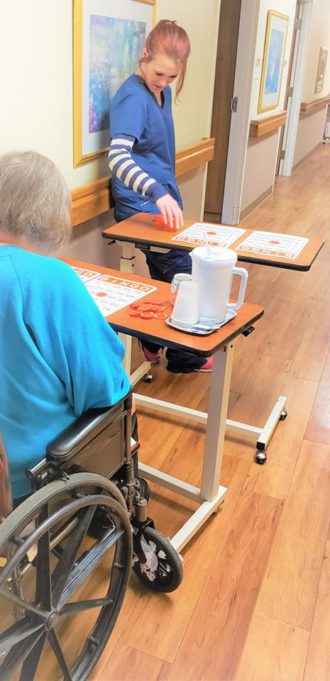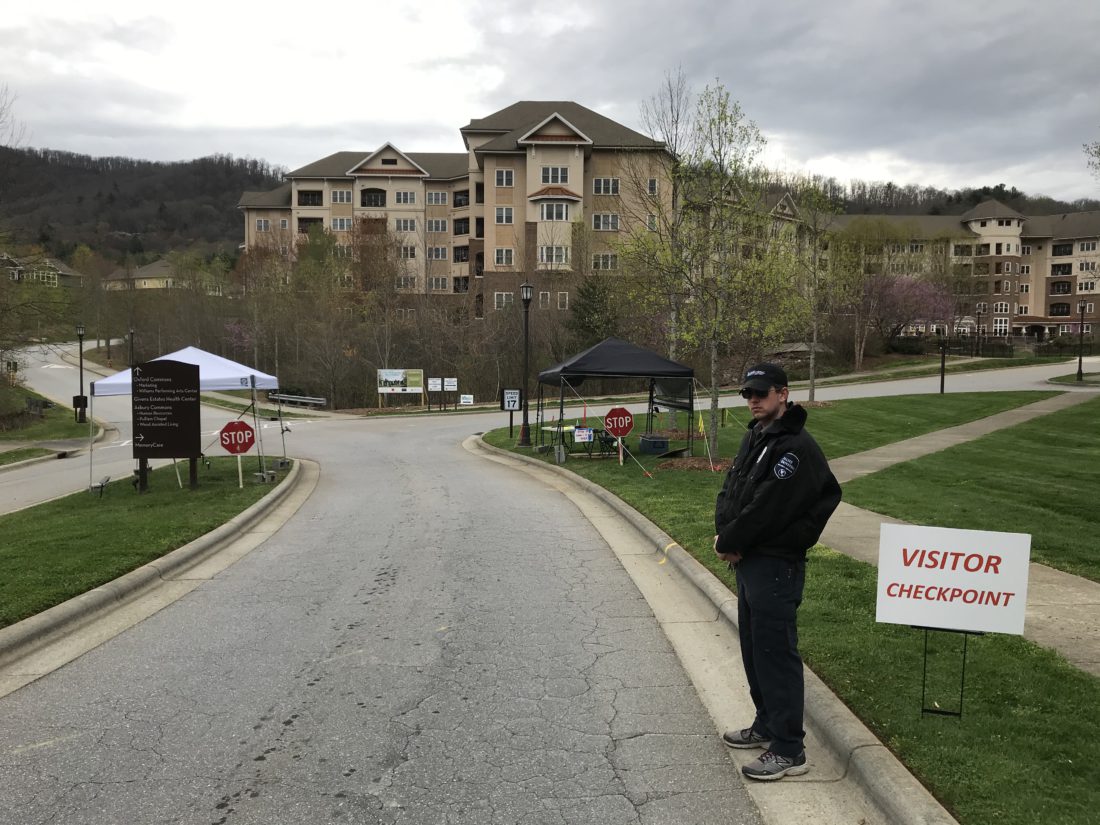Riceville resident Lisa McCallister used to visit her 86-year-old mother at an East Asheville nursing home every evening to help her eat her evening meal.
David Cohen would play Scrabble four times a week with his mother, 95, in an independent living facility for senior citizens a little east of downtown Asheville.
Not anymore. The COVID-19 pandemic has stopped those visits and other contacts between families and thousands of seniors who live in nursing homes, retirement communities, rest homes and other group facilities in Buncombe and nearby counties.
The well-being of those seniors is a major worry for both families and public health officials. The odds of a senior citizen dying if he or she contracts the virus are higher than for the general population, and residents typically live close to one another, meaning an infection could spread rapidly if it breaches the walls of a facility.
Cohen says employees at the Bella Vista Gracious Retirement Living complex where his mother lives “are doing everything they can to limit exposure, but there’s no such thing as 100%.”
“It seems like just about everybody [who lives there] would be somehow immunity compromised. Some people are on walkers; some are on oxygen,” he says.
“In a place like that [COVID-19] would run rampant” if just a few people were infected, Cohen worries.
Outbreaks
Buncombe County alone has nearly 4,000 beds in nursing homes, adult care homes and similar facilities licensed by the state government. There are probably thousands more seniors in retirement communities, apartment complexes for seniors and similar facilities in the county not regulated by the state.
The state Department of Health and Human Services said April 13 that there were 45 ongoing outbreaks of COVID-19 cases in nursing homes, other residential care facilities and prisons or jails. So far, none are in Buncombe County.
State figures starkly illustrate why facilities for senior citizens are such a worry. Seniors account for 25% of confirmed COVID-19 cases but 80% of deaths related to the virus statewide.
Steven Smith, health director for Henderson County, told county commissioners there March 31 there were five confirmed COVID-19 cases in long-term care facilities in the county, “which is certainly of grave concern for us.”
Cases snowballed quickly. Five days later, the county announced that 23 staff and residents at Cherry Springs Village assisted living facility in Hendersonville had COVID-19. County Department of Public Health spokesperson Jodi Grabowski says that as of April 13, two nursing homes and Cherry Springs had announced they had COVID-19 outbreaks, defined as instances of two or more cases in the same facility.
The number of confirmed COVID-19 cases in Henderson County had jumped to 99, by far the largest total for any Western North Carolina county, and 82 of those cases occurred at the facilities with outbreaks, Grabowski said. Six people with COVID-19 had died in the county, although Grabowski said state researchers may ultimately attribute some of those deaths to other causes.
No admittance
Nursing homes and many other facilities for seniors in Buncombe County have dramatically changed their operations in response to the pandemic. Bans on nonessential visitors and a halt to group activities and dining for residents are common. Workers typically bring meals to residents. Nursing homes have cleared out areas where infected residents could be quarantined.
At Aston Park Health Care Center, a nursing home in West Asheville, “The only people that are getting in and out are employees,” Executive Director Marsha Kaufman says.
Before starting their duties, each employee is asked about possible COVID-19 symptoms and exposure to others. A staffer takes and records their temperature. One employee who had attended a wedding and others with minor respiratory issues have been turned away, Kaufman says.
“There’s a lot of allergies going around right now as well, but we’re trying to be as careful as we can be. It’s better to be careful than to get it in your facility,” she says.
Chris Elmer, administrator of Western North Carolina Baptist Home in West Asheville, says state and federal authorities have given facilities like his extensive guidelines to follow “and we’re going to do what we’re told to do.”
Precautions even include treating packages coming into the nursing home and assisted living facility with Lysol spray or bleach, he said.
‘The game MUST GO ON!’

At Pisgah Valley Retirement Community in Candler, which includes nursing home and assisted living facilities, “Group activities have been discontinued,” but staff are “providing outdoor time for residents in our courtyards, leading hallway bingo games and assisting video chats between residents and their loved ones,” Administrator Michelle Grandy said.
Instead of one bingo game for all Aston Park residents, employees have put on rotating games in each hallway. Residents come to the doors of their rooms and play from there.
“Precautions must be made, but the game MUST GO ON!” the facility’s Facebook page says.
Activities like exercise classes and daily devotionals at Givens Estates, a large retirement community in South Asheville, are now offered via Givens’ in-house television channel instead of in group gatherings. Some are canceled.
Halting group activities and general visitation “is creating some social isolation for folks,” says Executive Director John Cowan, but the coronavirus has not necessarily generated waves of fear.
“Overall, residents are taking the threat seriously. They see their job … as stay safe, stay home so they don’t become a burden,” he says.
Marjie Tucker, who lives in an apartment at Givens with her husband, Jim, endorses the precautions.
“We’re in a little pocket that is very safe,” she says. But she misses visiting friends who also live at Givens: “We just wave to each other from a distance.”
Elmer, however, sees significant unease among WNC Baptist Home residents.
“They’re being bombarded by news outlets like yours every day,” he told a reporter. “Anybody who’s got any sense is worried.”
Reach out and touch someone
Not being able to see elderly loved ones in person is tough for families, although administrators at local facilities say relatives are generally supportive of the restrictions.
Cohen says his mother, Shirley Cohen, sometimes doesn’t properly hang up her landline telephone and can’t find her mobile phone, meaning her children can’t reach her. “It can be a little scary,” he says.
McCallister says while daily visits to her mother are suspended, “It’s like a piece of your normal routine is missing that you need to do and you want to do, but we can’t.” Her mother, Billie Shope, has Alzheimer’s disease and no longer speaks. Rules against visitation meant the family couldn’t go to Shope’s room to celebrate her birthday recently.
Instead, a few relatives gathered outside and taped balloons and a “Happy Birthday” banner to a window. Nursing home staff brought Shope to the window and, in honor of Shope’s long-time involvement with the Riceville Volunteer Fire Department, a department fire truck and ambulance drove past.
Shope brightened, McCallister recalls. “It was very special.”



Before you comment
The comments section is here to provide a platform for civil dialogue on the issues we face together as a local community. Xpress is committed to offering this platform for all voices, but when the tone of the discussion gets nasty or strays off topic, we believe many people choose not to participate. Xpress editors are determined to moderate comments to ensure a constructive interchange is maintained. All comments judged not to be in keeping with the spirit of civil discourse will be removed and repeat violators will be banned. See here for our terms of service. Thank you for being part of this effort to promote respectful discussion.